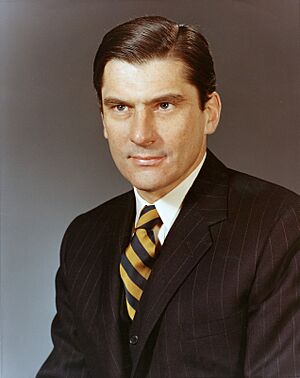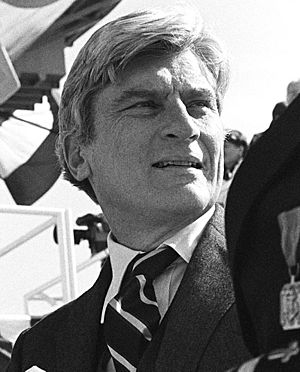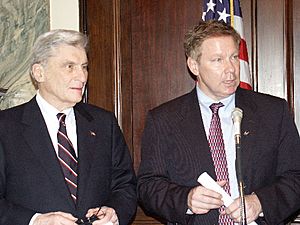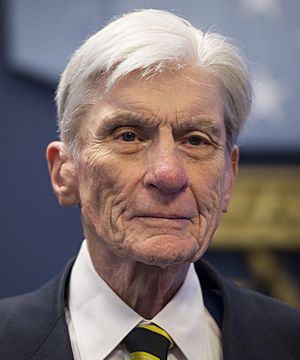John Warner facts for kids
Quick facts for kids
John Warner
|
|
|---|---|
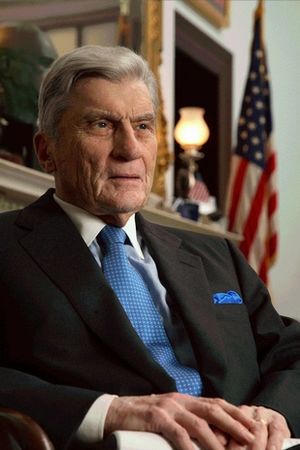
Warner in 2008
|
|
| United States Senator from Virginia |
|
| In office January 2, 1979 – January 3, 2009 |
|
| Preceded by | William L. Scott |
| Succeeded by | Mark Warner |
| Chair of the Senate Armed Services Committee | |
| In office January 3, 2003 – January 3, 2007 |
|
| Preceded by | Carl Levin |
| Succeeded by | Carl Levin |
| In office January 3, 1999 – June 6, 2001 |
|
| Preceded by | Strom Thurmond |
| Succeeded by | Carl Levin |
| Chair of the Senate Rules Committee | |
| In office September 12, 1995 – January 3, 1999 |
|
| Preceded by | Ted Stevens |
| Succeeded by | Mitch McConnell |
| 61st United States Secretary of the Navy | |
| In office May 4, 1972 – April 8, 1974 |
|
| President | Richard Nixon |
| Preceded by | John Chafee |
| Succeeded by | J. William Middendorf |
| United States Under Secretary of the Navy | |
| In office February 11, 1969 – May 4, 1972 |
|
| President | Richard Nixon |
| Preceded by | Charles F. Baird |
| Succeeded by | Frank P. Sanders |
| Personal details | |
| Born |
John William Warner III
February 18, 1927 Washington, D.C., U.S. |
| Died | May 25, 2021 (aged 94) Alexandria, Virginia, U.S. |
| Resting place | Arlington National Cemetery |
| Political party | Republican |
| Spouses |
|
| Children | 3 |
| Education | |
| Awards | Knight Commander of the Order of the British Empire |
| Signature | |
| Military service | |
| Allegiance | |
| Branch/service | |
| Years of service |
|
| Rank |
|
| Unit | 1st Marine Aircraft Wing |
| Battles/wars | |
John William Warner III (born February 18, 1927 – died May 25, 2021) was an American lawyer and politician. He served as the United States Secretary of the Navy from 1972 to 1974. Later, he was a U.S. Senator for five terms. He represented Virginia as a Republican from 1979 to 2009.
Warner was a chairman of important committees. He led the Senate Armed Services Committee from 1999 to 2001 and again from 2003 to 2007. He also chaired the Senate Rules Committee from 1995 to 1999.
He was a veteran of both World War II and the Korean War. When he retired, he was one of only five World War II veterans still serving in the Senate. He decided not to run for re-election in 2008. After leaving the Senate, he worked as a lawyer.
Contents
Early Life and Education
John William Warner III was born in Washington, D.C., on February 18, 1927. His father was a doctor. John grew up in Washington, D.C., and went to St. Albans School. He then graduated from Woodrow Wilson High School in 1945.
In January 1945, just before turning 18, Warner joined the United States Navy during World War II. He served for about a year and left as a petty officer third class. After the war, he attended Washington and Lee University, graduating in 1949. He then started law school at the University of Virginia.
In October 1950, when the Korean War began, Warner joined the U.S. Marine Corps. He served in Korea as an officer who helped maintain aircraft. He stayed in the Marine Corps Reserves after the war and became a captain. He finished his law degree from the University of Virginia in 1953.
After law school, he worked for a judge. In 1956, he became a prosecutor. In 1960, he started working as a private lawyer. He also helped Richard Nixon's presidential campaign in 1960.
After helping Richard Nixon's successful presidential campaign in 1968, Warner was appointed to a government role. In February 1969, he became the Under Secretary of the Navy. This meant he was a high-ranking official in the Navy Department.
On May 4, 1972, he became the United States Secretary of the Navy. This is the top civilian leader of the U.S. Navy. As Secretary, he worked on international agreements. He helped negotiate a deal with the Soviet Union about naval incidents at sea. This agreement helped improve relations between the two countries.
Serving as a U.S. Senator
After leaving his Navy role, Warner decided to run for political office. In 1978, he ran for a U.S. Senate seat in Virginia. He won the election and became a U.S. Senator. He served in the Senate until January 3, 2009.
He became the second longest-serving senator from Virginia. He was also the longest-serving Republican Senator from the state. On August 31, 2007, he announced he would not seek re-election.
Important Committee Roles
As a Senator, Warner was part of several important committees. He was a member of the Environment and Public Works Committee. He also served on the Senate Committee on Health, Education, Labor, and Pensions. Another role was on the Senate Select Committee on Intelligence.
His most significant role was chairman of the Senate Armed Services Committee. This committee handles military matters. As chairman, he helped direct money to military bases and shipbuilding companies in Virginia. This supported the state's economy.
Political Views and Key Votes
Warner was known for being a moderate Republican. This meant he often worked with both parties. He supported some gun control laws. For example, he voted for the Brady Bill. In 1999, he was one of only five Republicans to vote to close a loophole for gun sales at gun shows. He also supported efforts to bring back the Assault Weapons Ban.
In 2004, Warner voted to expand hate crime laws to include sexual orientation. He supported a constitutional amendment about marriage. However, he had concerns about a specific amendment that might have banned civil unions.
In 1987, he was one of the few Republicans to vote against Robert Bork for the Supreme Court. Warner was easily re-elected in 1984 and 1990. In 1996, he faced a close election against Mark Warner (no relation). John Warner won with 52% of the vote.
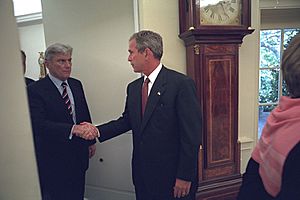
During the impeachment of President Bill Clinton, Warner voted against one of the charges. This decision angered some members of his own party. In 2002, he won re-election easily again.
In 2005, Warner was part of a group of 14 senators called the "Gang of 14." They worked together to find a compromise on how judges are approved. This group helped avoid a major political conflict.
Warner also spoke out about how the U.S. treated prisoners in 2006. He worried that certain actions could put U.S. soldiers at risk in future wars. He believed the U.S. should uphold the Geneva Conventions.
In 2007, he disagreed with a military leader's views on homosexuality. He also called for U.S. troops to start coming home from Iraq. He wanted to show Iraqi leaders that the U.S. commitment was not endless.
Warner supported America's Climate Security Act of 2007. This bill aimed to limit carbon emissions in the U.S. It also proposed using Carbon credits to align with Kyoto protocol goals. In 2008, he joined a group of senators working on energy reform. He also voted for the Emergency Economic Stabilization Act of 2008.
Committee Assignments
- Committee on Environment and Public Works
- Subcommittee on Private Sector and Consumer Solutions to Global Warming and Wildlife Protection (Ranking Member)
- Subcommittee on Transportation and Infrastructure
- Committee on Armed Services
- Subcommittee on Airland
- Subcommittee on Emerging Threats and Capabilities
- Subcommittee on SeaPower
- Committee on Homeland Security and Governmental Affairs
- Ad Hoc Subcommittee on State, Local, and Private Sector Preparedness and Integration
- Permanent Subcommittee on Investigations
- Subcommittee on Oversight of Government Management, the Federal Workforce, and the District of Columbia
- Select Committee on Intelligence
- Committee on Banking, Housing, and Urban Affairs
- Committee on Energy and Natural Resources
Life After the Senate
After leaving the Senate, John Warner continued to be active. He worked as a senior advisor at a law firm in Washington, D.C. He focused on aerospace, defense, and government services.
He often endorsed candidates from both political parties. He supported Mark Warner, his former rival, to succeed him in the Senate. In 2016, he endorsed Hillary Clinton for president. In 2020, he endorsed Joe Biden for president. He also endorsed other Democratic and Republican candidates.
In 2020, Warner and over 130 other former Republican national security officials signed a statement. They said that President Trump was not fit for another term. They believed Joe Biden should be the next president.
Honors and Awards
John Warner received many honors for his service.
- In 2008, he received the first-ever National Intelligence Distinguished Public Service Medal.
- In 2009, the Navy announced they would name a new submarine after him. The USS John Warner was commissioned in 2015.
- In 2009, Queen Elizabeth II named him an honorary Knight Commander. This was for his work in strengthening the American-British military alliance.
- The University of Virginia gives an annual Senator John W. Warner Award. It goes to a student who wants to seek public office.
- In 2013, a new center for advanced military studies was built. It was named the Senator John W. Warner Center at Marine Corps University.
Personal Life
In 1957, John Warner married Catherine Conover Mellon. They had three children: Virginia, John IV, and Mary. They divorced in 1973.
In 1976, Warner married actress Elizabeth Taylor. They divorced in 1982. He was the last of her seven husbands.
In 2003, he married Jeanne Vander Myde. She was a real estate agent.
Death
John Warner passed away from heart failure on May 25, 2021. He was 94 years old and died at his home in Alexandria, Virginia. His funeral was held on June 23, 2021, at Washington National Cathedral. President Joe Biden and other important figures spoke at the service.
Electoral Results
| 1978 United States Senate election in Virginia | |||||
|---|---|---|---|---|---|
| Party | Candidate | Votes | % | ±% | |
| Republican | John Warner | 613,232 | 50.2 | ||
| Democratic | Andrew P. Miller | 608,511 | 49.8 | ||
| 1984 United States Senate election in Virginia | |||||
|---|---|---|---|---|---|
| Party | Candidate | Votes | % | ±% | |
| Republican | John Warner (Incumbent) | 1,406,194 | 70.1 | +19.9 | |
| Democratic | Edythe C. Harrison | 601,142 | 29.9 | ||
| 1990 United States Senate election in Virginia | |||||
|---|---|---|---|---|---|
| Party | Candidate | Votes | % | ±% | |
| Republican | John Warner (Incumbent) | 846,782 | 80.4 | +10.3 | |
| Independent | Nancy B. Spannaus | 196,755 | 18.7 | ||
| 1996 United States Senate election in Virginia | |||||
|---|---|---|---|---|---|
| Party | Candidate | Votes | % | ±% | |
| Republican | John Warner (Incumbent) | 1,235,743 | 52.5 | -27.9 | |
| Democratic | Mark Warner | 1,115,981 | 47.4 | ||
| 2002 United States Senate election in Virginia | |||||
|---|---|---|---|---|---|
| Party | Candidate | Votes | % | ±% | |
| Republican | John Warner (Incumbent) | 1,229,894 | 82.6 | +30.1 | |
| Independent | Nancy B. Spannaus | 145,102 | 9.7 | ||
| Independent | Jacob Hornberger | 106,055 | 7.1 | ||
Images for kids
-
Committee chairman Carl Levin (D-MI) and ranking member John Warner (R-VA) listen to Admiral Mike Mullen's confirmation hearing before the Armed Services Committee to become Chairman of the Joint Chiefs of Staff, July 31, 2007. Levin and Warner died two months apart.
See also
 In Spanish: John Warner para niños
In Spanish: John Warner para niños
 | Mary Eliza Mahoney |
 | Susie King Taylor |
 | Ida Gray |
 | Eliza Ann Grier |


